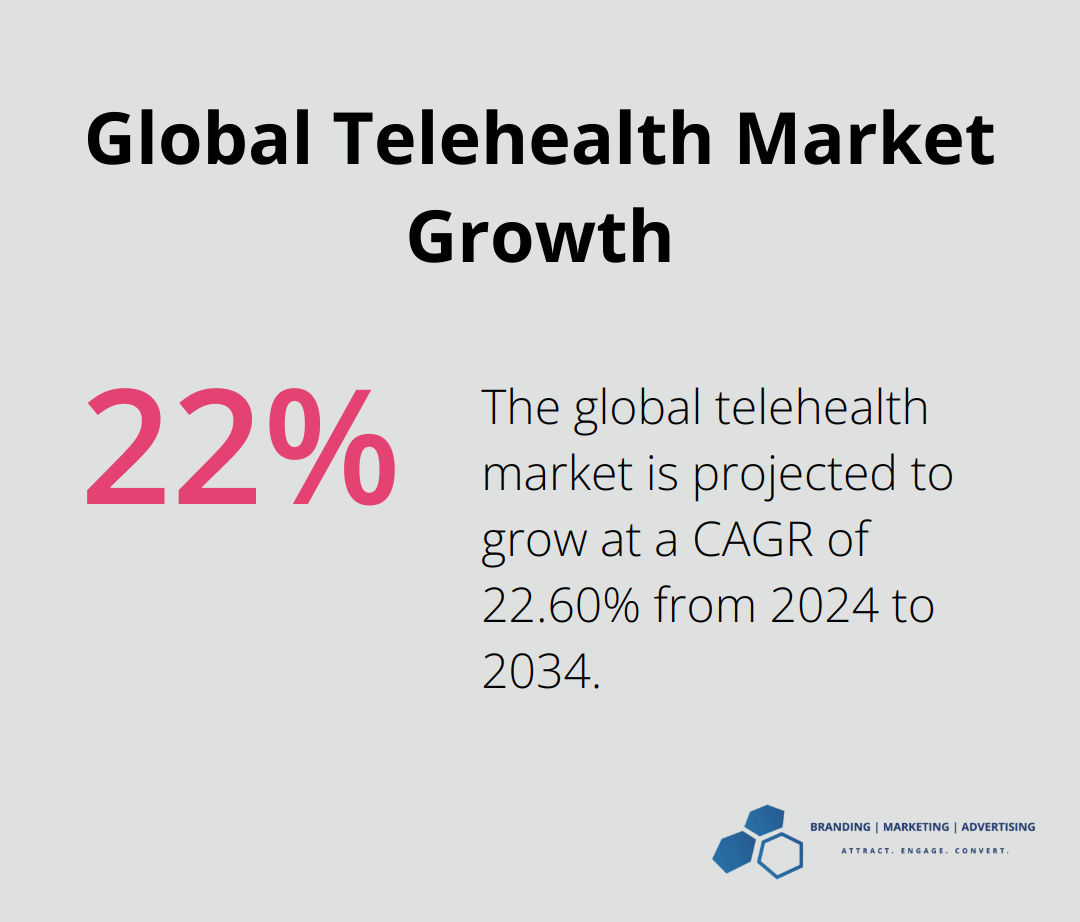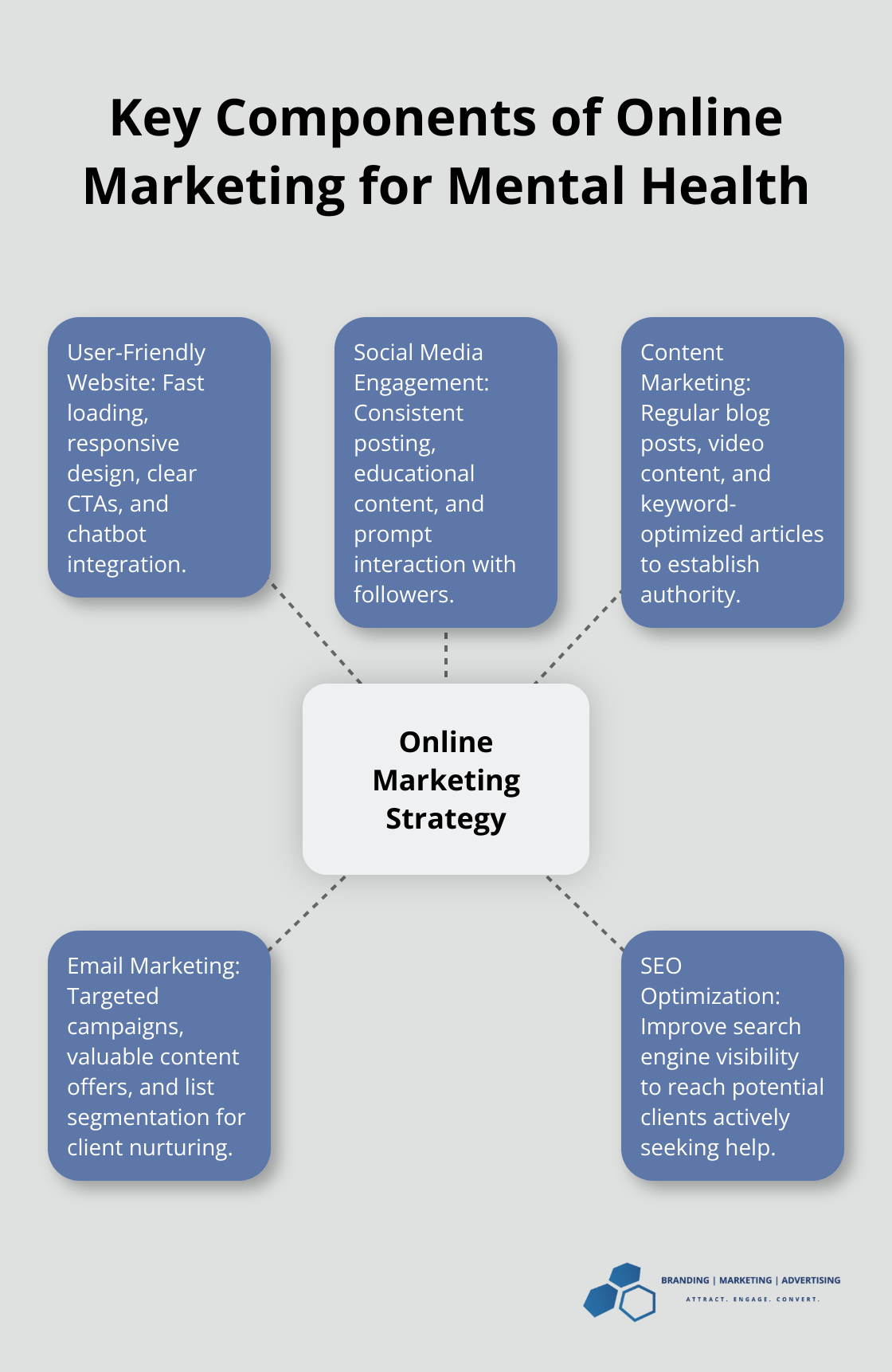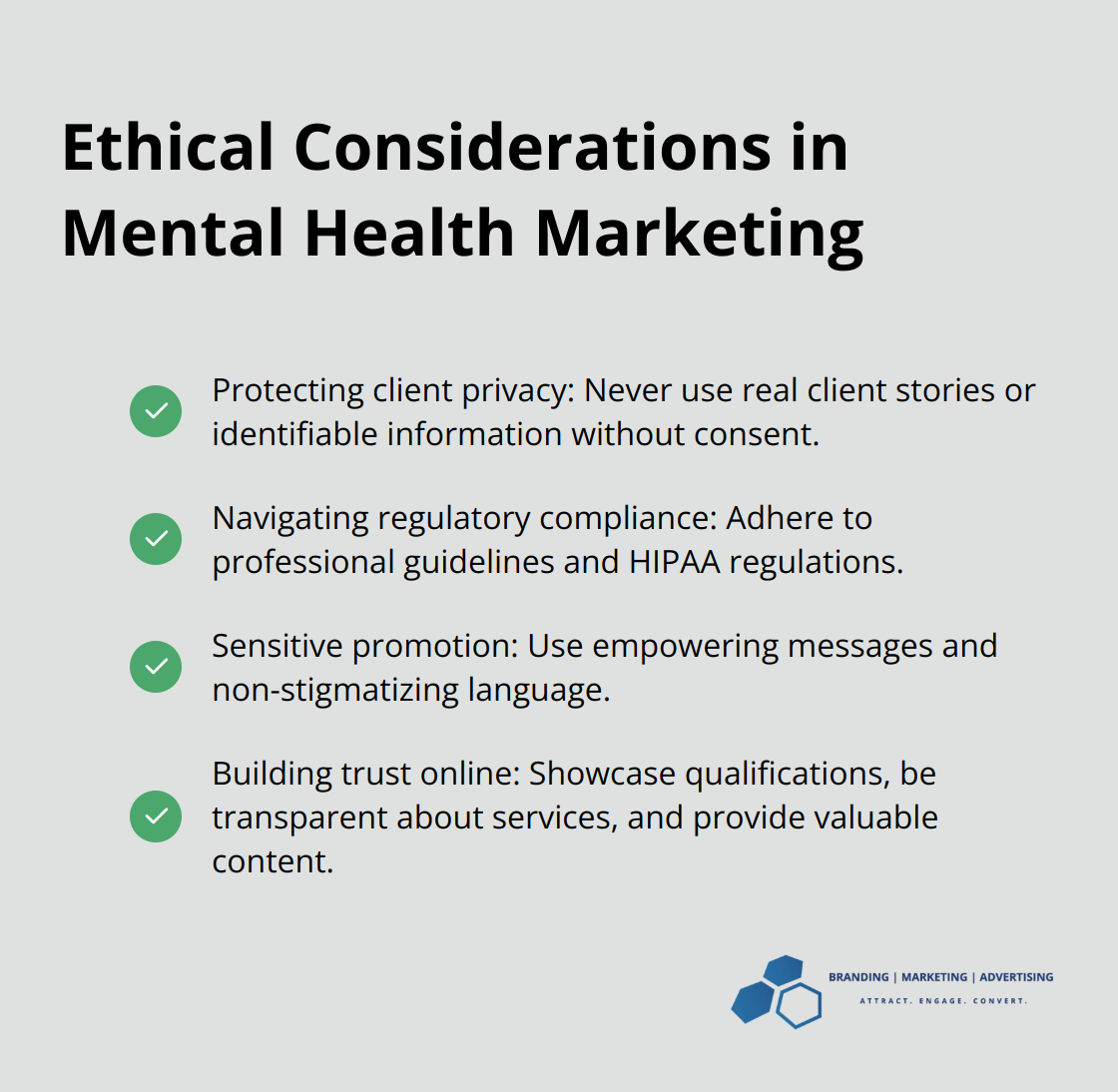How to Market Mental Health Services Online
At Branding | Marketing | Advertising, we’ve seen a surge in mental health professionals seeking effective online marketing strategies.
The digital landscape offers unique opportunities for therapists and counselors to connect with those in need of support.
This post will guide you through the essentials of digital marketing for mental health professionals, helping you build a strong online presence and reach more clients.
We’ll cover everything from website optimization to social media engagement, ensuring you can ethically and effectively promote your services in the digital realm.
Why Digital Marketing Is Essential for Mental Health Services
The Digital Shift in Mental Health
The mental health landscape has undergone a significant transformation in recent years. The global telehealth market size stood at USD 158.55 billion in 2024 and is poised to reach approximately USD 1211.14 billion by 2034, growing at a CAGR of 22.60%. This growth reflects in the increasing number of people who turn to online platforms for mental health support.

These numbers highlight the importance of a strong digital marketing strategy for mental health services. Patients actively search for help online, and it’s vital that your practice remains visible and accessible when they do.
Key Platforms for Mental Health Marketing
When it comes to marketing mental health services online, certain platforms prove particularly effective. Social media platforms like Facebook, Instagram, and LinkedIn offer excellent opportunities to connect with potential clients and share valuable mental health content.
Search engines, especially Google, play a pivotal role in how people find mental health services. Optimizing your website for search engines (SEO) is essential.
Building Trust Through Online Presence
A strong online presence extends beyond visibility; it builds trust and credibility. In the mental health field, where trust is paramount, your <a href=”https://bestbma.com/how-to-market-your-mental-health-practice-effectively/”>digital footprint</a> can influence a potential client’s decision to reach out.
Creating valuable content that addresses common mental health concerns can position you as an authority in your field. This could include blog posts, videos, or podcasts that provide insights and tips on managing mental health.
Leveraging Online Reviews
Online reviews have become a critical factor in decision-making for potential clients. Higher ratings of aesthetics have been found to correlate with higher consumer ratings of digital mental health applications. Encouraging satisfied clients to leave reviews on platforms like Google My Business can significantly boost your online reputation and attract new clients.
The Power of Targeted Advertising
Pay-per-click (PPC) advertising, particularly through Google Ads, can prove highly effective for mental health services. Targeting specific, solution-aware keywords allows you to reach potential clients at the exact moment they seek help.
Email Marketing for Client Nurturing
Email marketing remains a powerful tool for nurturing relationships with potential and existing clients. Regular, informative newsletters can keep your practice top-of-mind and provide valuable mental health resources to your audience.
The digital landscape offers immense opportunities for mental health professionals to connect with those in need. These online platforms and strategies can expand your reach, build trust, and ultimately help more people access the mental health support they need. As we move forward, let’s explore how to develop a comprehensive online marketing strategy tailored specifically for mental health services.
How to Create a Winning Online Marketing Strategy
At Branding | Marketing | Advertising, we’ve witnessed the transformative power of well-crafted online marketing strategies for mental health practices. Let’s explore the key components that will set your practice apart in the digital landscape.
Building a User-Friendly Website
Your website often serves as the first point of contact for potential clients. It must be visually appealing, functional, and informative. Users form opinions about websites in just 50 milliseconds. This fact underscores the importance of making an immediate positive impression.
Prioritize fast loading times for your website. Google reports that 53% of mobile site visits are abandoned if pages take longer than 3 seconds to load. Use a responsive design that adapts to all screen sizes, as mobile devices now account for over half of all web traffic.
Include clear calls-to-action (CTAs) throughout your site. Make it easy for visitors to book appointments or contact you. Consider implementing a chatbot for immediate responses to common questions.
Harnessing the Power of Social Media
Social media platforms offer unparalleled opportunities to connect with potential clients. A Pew Research Center study found that 72% of U.S. adults use some type of social media. For mental health professionals, platforms like Facebook, Instagram, and LinkedIn can be particularly effective.
Create a content calendar to maintain a consistent posting schedule. Share a mix of educational content, personal insights, and practice updates. Use hashtags relevant to mental health to increase visibility.
Engage with your followers by responding to comments and messages promptly. This interaction builds trust and shows potential clients that you’re attentive and caring.
Content Marketing: Establishing Authority
Content marketing proves to be a powerful tool for establishing your authority in the mental health field. Healthcare companies are experiencing the highest weekly follower growth on social media platforms.
Start a blog on your website and regularly publish articles addressing common mental health concerns. Use keyword research tools to identify topics your potential clients are searching for.
Consider creating video content as well. YouTube ranks as the second largest search engine after Google, and video content can engage many users more effectively. Short, informative videos on mental health topics can attract viewers and drive traffic to your website.

Email Marketing: Nurturing Client Relationships
Email marketing remains one of the most effective digital marketing strategies. For mental health professionals, it’s an excellent way to nurture relationships with both potential and existing clients.
Build your email list by offering valuable content in exchange for email addresses. This could include an e-book on stress management techniques or a series of guided meditation audio files.
Segment your email list based on factors like client status (potential vs. existing) or specific mental health concerns. This approach allows you to send targeted, relevant content to each group.
Always comply with healthcare privacy regulations like HIPAA when sending emails. Never include sensitive health information in your marketing emails.
These strategies form the foundation of a comprehensive online marketing approach that attracts and retains clients. As we move forward, we’ll explore the ethical considerations and best practices that are essential when marketing mental health services online.
Ethical Marketing in Mental Health
Protecting Client Privacy
We prioritize client confidentiality in mental health marketing. We never use real client stories or identifiable information in our marketing materials without explicit consent. Instead, we create composite case studies or use generalized examples to illustrate the benefits of mental health services.
When we collect data through website forms or email subscriptions, we implement robust security measures. We use encrypted forms and secure servers to protect sensitive information. It’s important to clearly communicate your privacy policy and obtain informed consent before collecting any personal data.
Navigating Regulatory Compliance
Adherence to professional guidelines and regulations is critical in mental health marketing. The American Psychological Association (APA) provides ethical guidelines for advertising and other public statements. To be successful in the business of practice, it is essential that practitioners engage in effective ongoing advertising and marketing practices.
We ensure all marketing materials comply with HIPAA regulations. The HIPAA Privacy Rule establishes national standards to protect individuals’ medical records and other individually identifiable health information. We recommend regular audits of your marketing practices to ensure ongoing compliance with evolving regulations.
Sensitive Promotion
We balance promotion with sensitivity to mental health issues. We avoid fear-based marketing tactics or exploiting vulnerabilities. Instead, we focus on empowering messages that emphasize hope, support, and the benefits of seeking help.
Language choice is important. We use inclusive, non-stigmatizing language that respects the experiences of individuals with mental health challenges. For example, we say “person with schizophrenia” rather than “schizophrenic.”
Building Trust Online
Establishing trust and credibility online is essential for mental health professionals. We recommend showcasing your qualifications, certifications, and areas of expertise prominently on your website. Including a professional photo and a warm, approachable bio can help potential clients feel more comfortable reaching out.
Transparency about your services, fees, and treatment approaches is key to building trust. We create clear, jargon-free content that explains what clients can expect from therapy. This helps set realistic expectations and reduces anxiety about seeking help.
Regular updates to your website and social media with valuable, evidence-based content demonstrate your ongoing commitment to your field and your clients’ well-being. This could include blog posts about coping strategies, updates on new research, or explanations of different therapy modalities.
<a href=”https://bestbma.com/how-to-market-your-mental-health-practice-effectively/”>Effective marketing strategies</a> prioritize ethical considerations, comply with professional standards, and build a reputation as a trustworthy, compassionate mental health provider. This approach attracts clients who value integrity and quality care, setting the foundation for successful therapeutic relationships.

<a href=”https://bestbma.com/creating-valuable-content-for-mental-health-audiences/”>Creating valuable content</a> is an essential part of ethical marketing. It provides helpful information to those seeking support while establishing your expertise in the field.
<a href=”https://bestbma.com/expanding-your-mental-health-practices-outreach-online/”>Ethical considerations</a> must guide all marketing efforts for mental health services. Prioritize client confidentiality and adhere to professional guidelines to ensure your outreach aligns with the sensitive nature of mental health services.
Final Thoughts
Digital marketing for mental health professionals offers significant opportunities to connect with those who need support. A user-friendly website, social media engagement, content marketing strategies, and email campaigns effectively reach and engage target audiences. Ethical considerations must guide these efforts to ensure client confidentiality and adherence to professional standards.
The digital landscape constantly evolves, and mental health practitioners must stay current with the latest trends and technologies. Regular updates to online presence, adaptation to new platforms, and strategy refinement based on data and feedback help maintain visibility and accessibility to potential clients.
Navigating the complexities of online marketing can challenge many mental health professionals. Partnering with experienced digital marketing specialists often yields the best results. Our team at Branding | Marketing | Advertising understands the unique needs of the mental health sector and can develop tailored strategies to enhance your online presence (and attract more clients).












